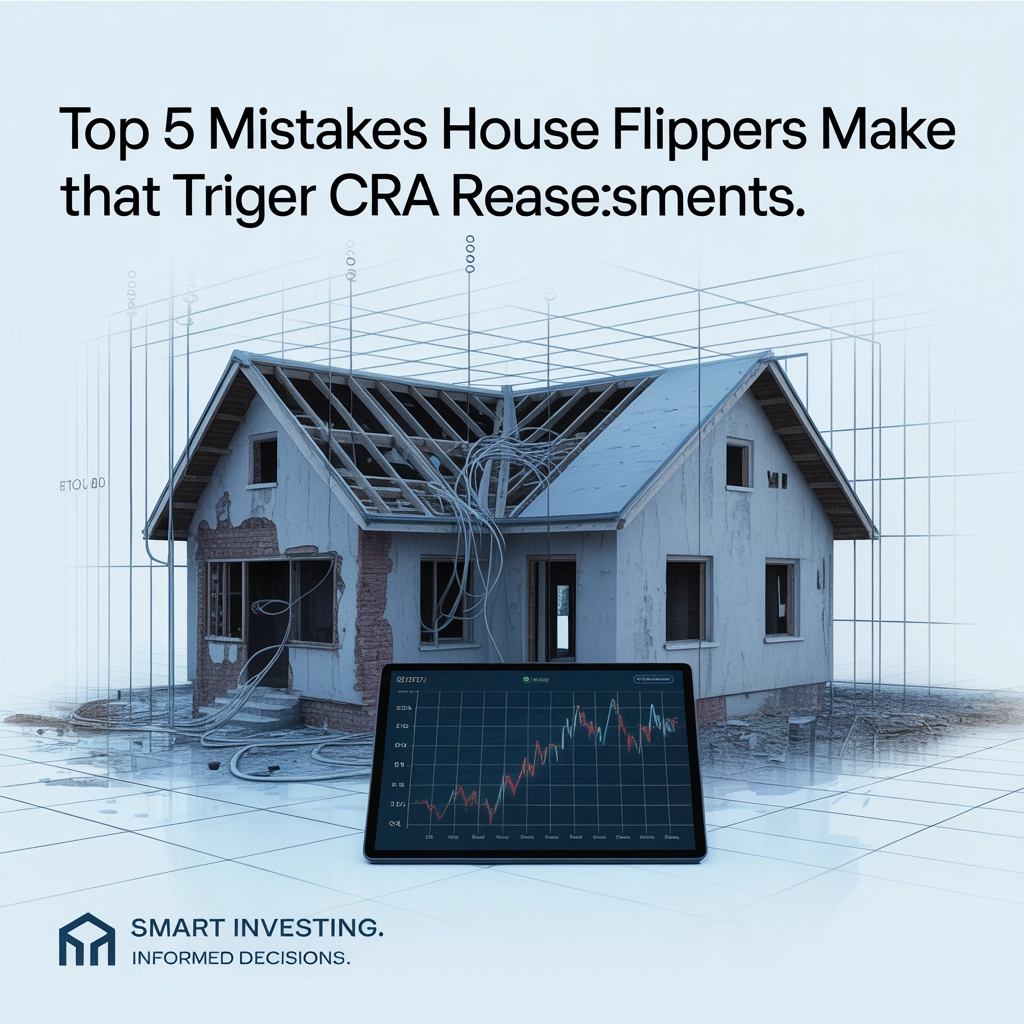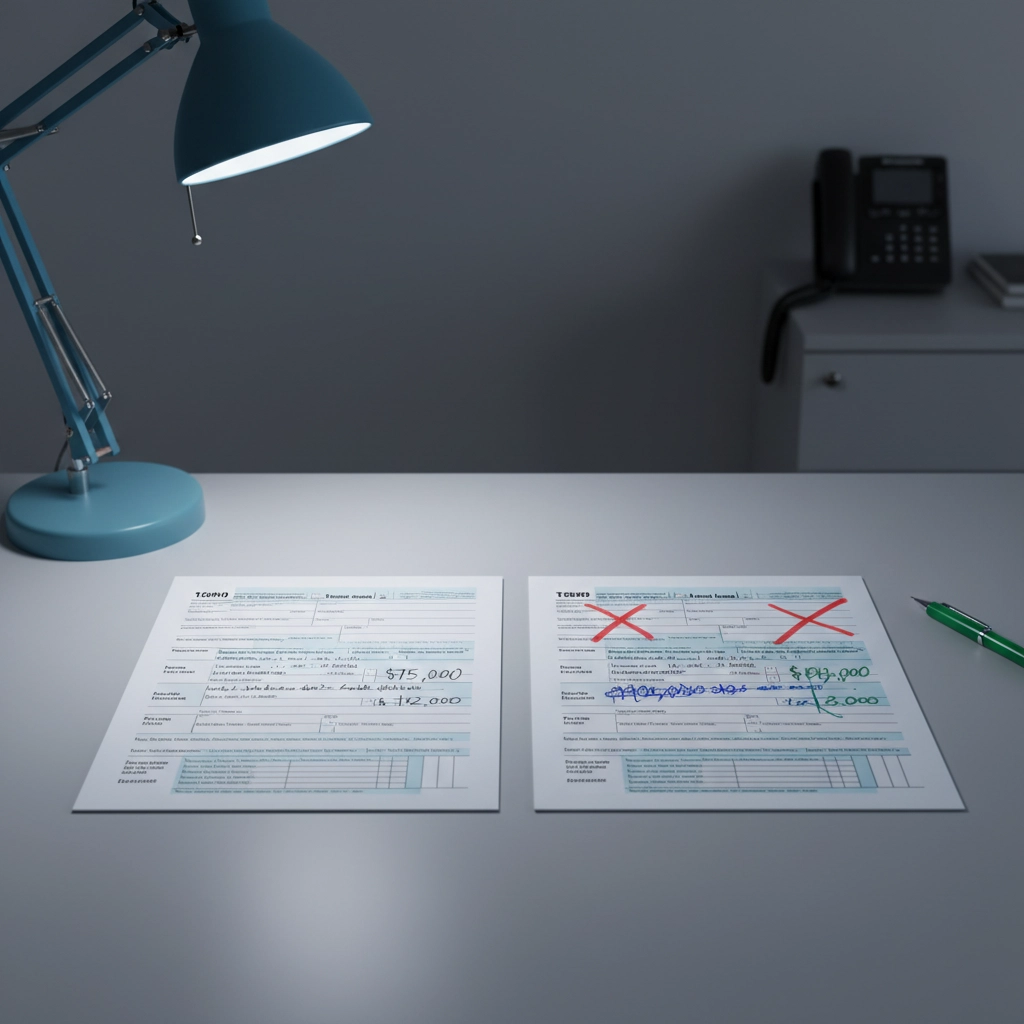
House flipping has become an increasingly popular investment strategy in Canada, but it has also attracted significant attention from the Canada Revenue Agency (CRA). With new property flipping rules introduced in 2022 and the CRA recovering $1.4 billion from real estate audit activities in Ontario alone between April 2015 and March 2023, understanding the common pitfalls that trigger reassessments has never been more critical.
The stakes are high. A single mistake can result in thousands of dollars in additional taxes, penalties, and interest charges. More importantly, certain errors can expose you to gross negligence penalties ranging from 5% to 50% of the reassessed amount. Are you making these costly mistakes without realizing it?
Mistake #1: Misunderstanding Primary vs. Secondary Intention
The most significant error house flippers make involves failing to properly assess their true intention when purchasing a property. The CRA examines both your primary and secondary intentions at the time of acquisition to determine whether a transaction constitutes an “adventure in the nature of trade.”
Many flippers assume that simply living in a property temporarily protects them from business income treatment. This assumption is wrong. Even if establishing a residence was your primary intention, having profit as a secondary motivation can still result in the sale being treated as business income rather than a capital gain.
Consider this real case: A taxpayer purchased properties while already owning another lot where construction had begun. The Tax Court ruled that the taxpayer’s primary intention was to resell the properties for profit, not to establish a long-term residence. The evidence of simultaneous property development activities contradicted claims of residential intent.

The CRA looks for specific indicators of intention, including:
- The length of time you owned the property
- Your occupation and real estate experience
- The frequency of similar transactions
- Improvements made to increase resale value
- The circumstances that led to the sale
- Your financing arrangements
Mistake #2: Incorrectly Claiming Principal Residence Exemption
The principal residence exemption represents one of the most valuable tax benefits available to Canadian homeowners, but it is also one of the most frequently misapplied by house flippers. Since 2016, the CRA requires all principal residence sales to be reported on annual tax returns, and they have aggressively ramped up audits in this area.
The exemption requires genuine intention to use the property as your principal residence for the long term, not merely a temporary dwelling while you plan renovations and resale. The CRA will scrutinize factors such as:
- Where you received mail and maintained your driver’s license
- The location of your employment and children’s schools
- Whether you maintained another residence simultaneously
- The duration of your actual occupancy
- Your stated intentions in purchase agreements and financing documents
A common scenario that triggers reassessment involves flippers who purchase properties specifically because they would be “easier to resell” rather than for legitimate residential purposes. The Tax Court has consistently ruled against taxpayers in these situations, regardless of whether they temporarily lived in the properties.
Mistake #3: Inadequate Documentation and Record-Keeping
Many house flippers operate with insufficient documentation, leaving themselves vulnerable to CRA reassessments and unable to defend their positions effectively. The CRA can reassess statute-barred tax years if they believe you made misrepresentations attributable to “neglect, carelessness or wilful default.”
However, taxpayers who maintain comprehensive documentation and can demonstrate they filed returns in accordance with published CRA interpretations have stronger protection against audits and reassessments. Proper documentation should include:
- Purchase agreements and all related correspondence
- Evidence of your living arrangements and residential intentions
- Records of improvements and renovation expenses
- Documentation of unexpected circumstances forcing sale
- Professional advice received regarding tax treatment
- Evidence supporting any claimed exemptions or exceptions
The burden of proof lies with you to demonstrate your intentions and circumstances. Without proper documentation, even legitimate residential sales can be reclassified as business transactions.

Mistake #4: Failing to Understand New Property Flipping Rules
The 2022 amendments to the Income Tax Act introduced specific anti-avoidance rules targeting property flipping abuse. These rules deem certain property sales as business income rather than capital gains, regardless of the taxpayer’s stated intentions.
Many flippers incorrectly claim exceptions to these new rules without proper justification or legal advice. The most common exceptions include:
- Death of the taxpayer or related person
- Household formation or breakdown
- Employment or business relocation
- Serious illness or disability
- Involuntary conversion due to natural disasters or expropriation
Each exception has specific requirements and limitations that must be carefully analyzed. The CRA has indicated they will likely audit anyone claiming exceptions to the property flipping rules, making professional guidance essential.
The new rules also interact with existing provisions in complex ways. For example, a property that qualifies for an exception under the new flipping rules might still be treated as business income under traditional “adventure in the nature of trade” principles if other factors indicate a profit motive.
Mistake #5: Making Misrepresentations on Tax Returns
The most serious mistake house flippers make involves providing false or misleading information on their tax returns. This error can trigger gross negligence penalties and extend the normal reassessment period indefinitely.
Gross negligence penalties apply when the CRA can prove your conduct represented “a marked and substantial departure from the conduct of a reasonable person.” Common misrepresentations include:
- Failing to report property sales entirely
- Incorrectly treating business income as capital gains
- Claiming principal residence exemptions without proper entitlement
- Overstating renovation costs or other deductible expenses
- Providing false information about occupancy or residential use
Even unintentional errors can result in significant penalties if the CRA determines you should have known better based on your experience or the advice you received. Property flippers with multiple transactions face particularly high scrutiny, as the CRA assumes experienced investors should understand their tax obligations.

The consequences extend beyond immediate financial penalties. Misrepresentations can trigger audits of other tax years and increase ongoing CRA scrutiny of your future filings. In severe cases, the CRA may pursue criminal prosecution for tax evasion.
How Beganyi Professional Corporation Protects House Flippers
Navigating the complex intersection of real estate transactions and tax law requires specialized expertise. At Beganyi Professional Corporation, we help house flippers and real estate investors avoid these costly mistakes through comprehensive legal and tax planning services.
Our approach includes:
Preventive Planning: We analyze your specific circumstances and intentions before you purchase properties, helping structure transactions to minimize tax exposure while maintaining compliance with all applicable rules.
Documentation Strategy: We help you establish and maintain the comprehensive documentation necessary to support your tax positions and defend against CRA audits.
Audit Defense: If the CRA challenges your tax treatment, we provide experienced representation throughout the audit process, working to minimize additional taxes and penalties.
Compliance Support: We ensure your tax filings accurately reflect your transactions and take advantage of all available exemptions and deductions.
The investment in professional guidance typically pays for itself many times over by avoiding the substantial costs of CRA reassessments and penalties.
Next Steps for House Flippers: Ensuring CRA Compliance
House flipping can be a profitable investment strategy, but success requires careful attention to tax compliance and proper professional guidance. The five mistakes outlined above represent the most common pitfalls that trigger costly CRA reassessments, but they are entirely avoidable with proper planning and documentation.
The key is to seek professional advice before making investment decisions, not after problems arise. Early consultation allows you to structure transactions appropriately and maintain the documentation necessary to support your tax positions.
If you are involved in house flipping or considering real estate investment activities, do not navigate these complex waters alone. The CRA’s increased scrutiny of real estate transactions means the margin for error has never been smaller.
Contact Beganyi Professional Corporation today to discuss your specific situation and develop a comprehensive strategy that protects your investments while ensuring full compliance with Canadian tax law. Our experienced team understands the nuances of real estate taxation and can help you avoid these costly mistakes while maximizing your investment returns.

